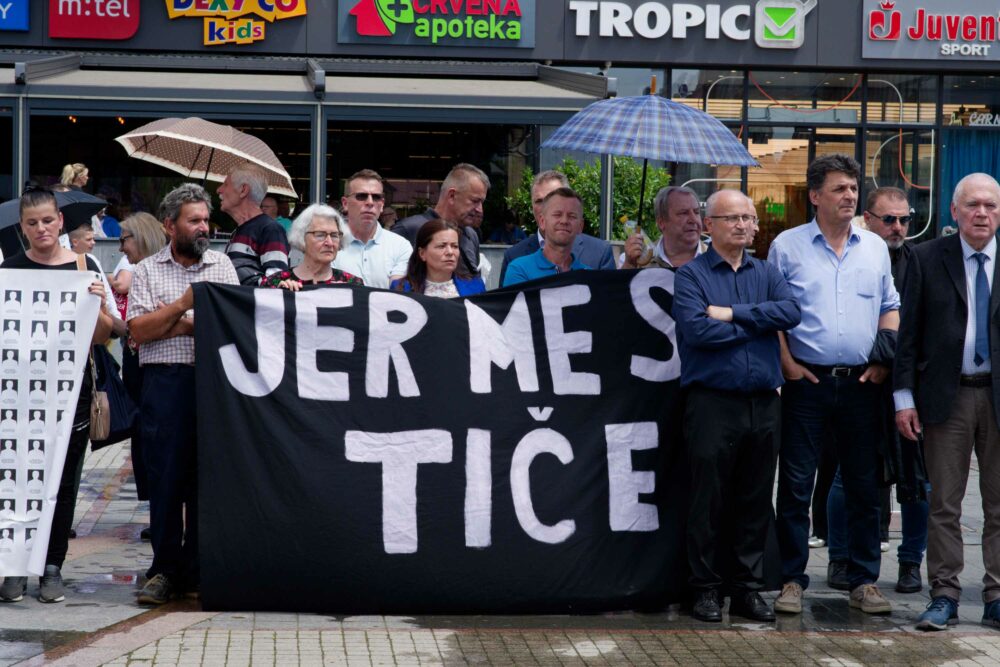A group of peace activists and war veterans, former members of the Army of RBiH, the Croatian Defence Council (HVO), the Croatian Army (HV), the Army of Republika Srpska (VRS), the Yugoslav People’s Army (JNA) and the Army of Yugoslavia (VJ), attended the marking of White Armband Day in memory of non-Serb civilians killed during the war from 1992 to 1995 in Prijedor and the surrounding area.
White Armband Day commemorates 31 May 1992 when the Prijedor Crisis Staff, under Serb Democratic Party (SDS) leadership, issued an order for the non-Serb population to mark their houses with white flags or sheets and to wear white armbands when leaving their homes. Once non-Serb civilians were thus marked in Prijedor and the surrounding area, mass detentions, killings and rapes ensued.
The crimes committed in Prijedor and its surroundings claimed the lives of 3176 people, including 102 children. Some 30,000 non-Serb residents of Prijedor were detained in the Trnopolje, Omarska and Keraterm camps.
Activists gathered around the initiative Jer me se tiče [Because it concerns me] are endeavouring to build a culture of memory about the past that will resist nationalist narratives. For years, this initiative has been organising events for White Armband Day (31 May) and for Night in Trnopolje (5 August) and it brings together diverse activists hoping to reach the public with a message condemning war crimes and war criminals and not using war victims to incite hatred.
Citizens started marking this date only in 2012, which was 20 years after the start of the crimes in Prijedor, and it began being marked in protest against the first bans on commemorations. At that time, the police had banned a commemoration for killed women and girls and we invoked the 1997 court judgement regarding that crime against Duško Tadić which stated that some people had been marked with white armbands, that they had to put white flags and white sheets on the roofs of their houses and on their balconies. That was the protest, it was about how to continue commemorating events and victims, to lift the ban imposed by the local authorities and the police. The main idea was to come up with a commemoration that couldn’t be banned. We invited people all over the world to lend their support to us in Prijedor and we soon broke through that blockade, so that next year we could mark White Armband Day, said Edin Ramulić, an activist with Jer me se tiče and the Kvart Youth Centre.
Even 32 years after the mass crimes in Prijedor, the city authorities refuse to approve a memorial commemorating the victims, so in a show of solidarity with the victims, the attendees wear white armbands while names of the killed children are read out and roses with their names are laid out in a circle.
I am here because it concerns me, because I’m expressing my solidarity with the citizens of Prijedor who have been fighting for years to have a memorial dedicated to 102 killed children and because I support the organisations and individuals in this city fighting for memory and to ensure what happened in Prijedor in 1992 is not erased. It is important to talk about all victims, about who they were and what they would have become if they hadn’t been killed, but it is also necessary to talk about the perpetrators and the ways that evil emerges to create criminals on one side and victims on the other, said Katarina Milićević, a peace activist and member of the Centre for Nonviolent Action, adding that she had been following the activities surrounding White Armband Days ever since 2012 when Emir Hodžić stood alone in the town square wearing a white armband.
According to the association of victims, over 60 final judgements have been passed down in cases related to the crimes committed in Prijedor.
Today, I am here for the first time, attending White Armband Day together with my friends and associates, war veterans and peace activists from the region. My feelings are mixed. On the one hand, I am struck by the sorrow that is inevitable at events such as this. Condensed in a moment, you feel the full force of pain and irretrievable loss suffered by the families of the victims. There are also elements of anger over the politicking that is still preventing victims from having a dignified memorial and having this community take a stand towards the crime that was committed and provide the families with some form of just satisfaction and recognition. If anything positive can be felt in this difficult moment, it is the way it is being commemorated, a rare example of inclusive memorialisation in the region, bearing no national or religious features, no impassioned political speeches… This opens the way for dialogue and understanding and sends a clear message to our society that we can come together to condemn the crime and express solidarity with all victims, said Amer Delić, a member of the CNA team.
Under the organisation of the Centre for Nonviolent Action, peace activists and war veterans from the region have attended commemorations in BiH in Gornji Vakuf, at Site 715 near Zavidovići, in Stog near Vozuća, in Novi Grad/Bosanski Novi, Sanski Most (Hrastova glavica), Sijekovac near Brod, Laništa near Brčko, Trusina near Konjic, Ahmići near Vitez, Grabovica, Uborak and Sutina near Mostar, Briševo and Zecovi near Prijedor, Korićanske stijene, Stupni Do near Vareš, Boderište near Brčko, the bridge over the Sava in Brčko, Bradina near Konjic, Skelani near Srebrenica, the Silo in Tarčin near Hadžići, Lozje near Goražde, Rogatica, and in Serbia in Grdelička klisura near Leskovac, Varvarin near Kruševac, Aleksinac, as well as in Croatia in Pakrac, Varivode and Gošić near Knin, and in Montenegro in Herceg Novi.

